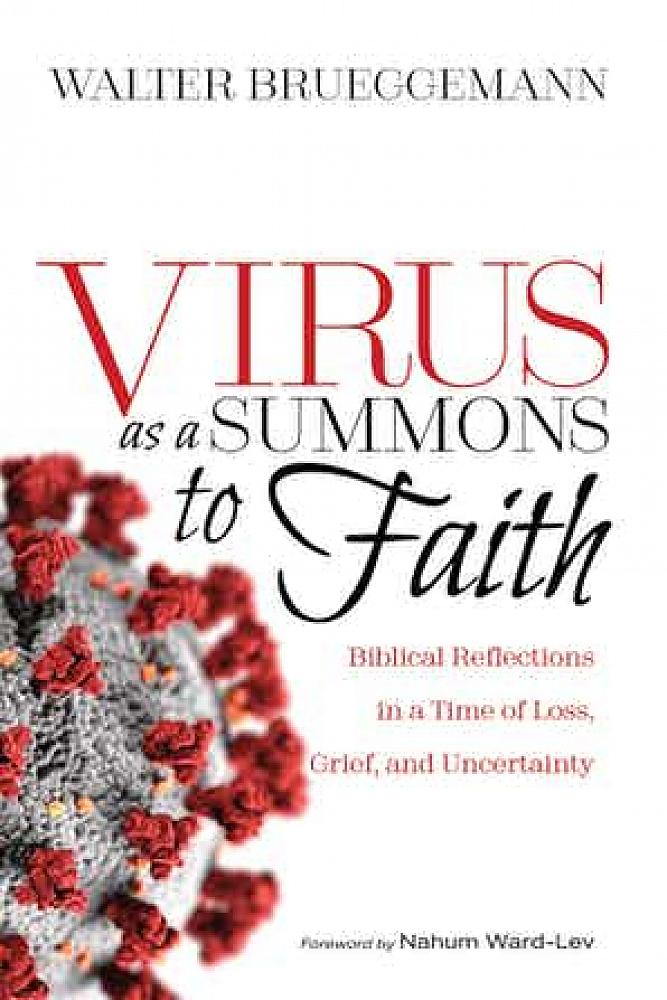
Book Review: Virus as a Summons to Faith: Biblical Reflections in a Time of Loss, Grief and Anxiety.
WALTER BRUEGGEMANN EUGENE, OR: CASCADE BOOKS, 2020. XII + 80PP. ISBN 978-1-7253-7673-4. $20.00
Many will know the name Brueggemann through his reputation at Columbia Theological Seminary in the United States, where he is now an emeritus professor. Others will know him as the author of more than one hundred books, including Old Testament commentaries. In this volume, as the subtitle shows, we are invited to turn to the Bible as we face a pandemic of international concern. Given that eight Old Testament books are the basis of the author’s ideas, his choice of Rabbi Nahum Ward-Lev to write the foreword is appropriate. This review aims to reinforce Ward-Lev’s summary of the book as timely and “a rich exploration of … valuable ancient insights” (viii). The chapter titles show originality and invite reflection in themselves, starting with “Reaping the whirlwind” in Chapter One and concluding with “The matrix of groan” in Chapter Seven. Each chapter ends with a prayer in the form of a poem.
A sentence in Chapter One, which draws its ideas from Exodus, Leviticus and Job, highlights the fact that despite many debatable points, one thing stands firm, namely the “non-negotiable givens of moral coherence in the world” (5). In the short second chapter we are invited to use our imaginations in response to the two title questions: “Pestilence… Mercy? Who knew?”. Answers come from 2 Samuel 24: 1-14. The author’s deep knowledge of the scriptures allows him to draw a number of similarities between David’s situation and ours, although he warns against looking for exact equivalents.
Chapter Three’s heading has a hint of optimism: “Until the dancing begins again”. Following some sad parallels with Jeremiah’s time, such as the cancelling of important events, there comes hope in the words of Jeremaiah 33: 10: “There shall once more be heard the voice of mirth…”. However, Christians needn’t wait for that day in order to do great things. We are reminded that the German hymn “Now thank we all our God” was written by Pastor Martin Rinkart during the Thirty Years War of the seventeenth century. What great things might we do right now in the midst of our own pandemic? Some suggestions come in Chapter Four, “Praying amid the virus”, where Brueggemann draws on the first book of Kings. The many problems that needed prayer then seem to dwarf our current situation. The prayer/ poem that ends the chapter is based on verses in Matthew (7: 7-10). Here are some words that stood out for me.
“Now, however, we are driven, some of us to unutterable prayers. We are driven to such prayer By awareness that our usual reliabilities are gone.” (44)
Psalm 77 is the basis of the fifth chapter, titled “The “turn” from self to God”. We are led through the laments of self-concern to a new world of imagination via a number of questions. In relation to these he makes an interesting point in quoting a scholar who “suggested that some rhetorical questions in the speech of the Old Testament are not mere rhetoric, but are serious questions” (48).
Chapter Six, “God’s new thing”, opens with a striking point for reflection. “It is possible to trust that the God of the Gospel is in, with, and under the crisis of the virus without imagining that God is the cause of it.” (57). The chapter is based on just two verses, Isaiah 43:18-19, and is correspondingly short itself: two pages plus a concluding poem. It will be up to individual readers to follow up Brueggemann’s suggestion of things we can let go of in these times, but in summary these are punitive measures, parsimony and predatory policies towards the vulnerable. Finally, in Chapter Seven, the author has, as so often through the book, chosen sub-titles which invite reflection even before one starts reading what follows. Try and predict what these sections might be about: “A Groan without a future” (66) and “A Future without groan” (67). The chapter’s closing poem allows a handy segue into mentioning another recent book written to address the relationship between faith and the current pandemic. It is a collection of poems by Wilfredo Weigandt, Prayer in the time of a pandemic (2021) from Langham Preaching Resources, which is recommended for anyone wanting to continue the theme of reflection.
At the end of the book, readers can see which sources the author drew on plus, in another list, further recommended reading. Finally, there is a Scripture Index indicating all the passages referred to. There is no need for the discussion points that often follow each chapter in a collection of Bible studies, since the whole book is one long reflection.
In these times when many people have extra moments to consider the meaning of life, a number of reasons come to mind for buying this book, rather than just flicking through a borrowed copy. The obvious one is to make use of the reflective prompts for oneself over time. Another reason is to pass the book on to others (if you can bear to part with it). A third reason is to provide ideas for conversations with others, whether believers or not. Both the content of this book and the fact that its author is still writing as he approaches the age of ninety should be an inspiration to many.
Marilyn Lewis has retired from the University of Auckland where she taught courses in language teaching and learning. Her qualifications include a Diploma in Theological Studies from Bryntirion College in Wales. Before the pandemic she travelled to speak to university teachers in various countries. Now Zoom is her means of speaking internationally.
